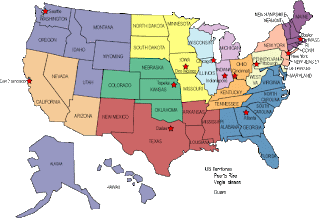Small government is anarchy. Politically reinforcing the idea government is unable to act responsibly to protect the public trust is worse than anarchy.
The standard of living and quality of life have been slipping in the USA.
This study by Gallup is a shifting baseline.
Five years?
I am not impressed.
May 10, 2013
by Alyssa Brown
In U.S., Standard of Living Perceptions Hit Five-Year High (click here)
WASHINGTON, D.C. -- Gallup's U.S. Standard of Living Index climbed to 40 in April, the highest monthly average in the five years Gallup has tracked this measure. The current score is up slightly from 38 in March and 35 in April of 2012....
A five year comparison since the 2008 might be interesting from a public perception perspective, however, it is not a true picture of where the USA was and where it is today.
 If this is the public's perception of the USA today, my objection is "What happened to their understanding of life?"
If this is the public's perception of the USA today, my objection is "What happened to their understanding of life?"
This is the reality I understand. The USA did not just blossom in the past five years. There is a history in this country and a proud history at that, stating each generation will do better than the one before. It's been turned into a lie.
By Dylan Matthews
Published: July 11, 2012 at 9:48 am
Poverty in the 50 years since ‘The Other America,’ in five charts (click here)
...There are two things to note here. First, there was a huge fall in the poverty rate throughout the 1960s, and in particular after LBJ announced the War on Poverty in 1964 and followed up with Medicaid, Medicare, greater federal housing spending, and other programs to fight that war. In 1964, the poverty rate was 19 percent. Ten years later, it was 11.2 percent, and it has not gone above 15.2 percent any year since then. Contrary to what you may have heard, the best evidence indicates that the War on Poverty made a real and lasting difference....
This is the USA I understand. This is the baseline I understand. I don't appreciate shifting baselines when an entire generation has been left out in the could by forty years of Republican ruin of this country.
We have to return good wages to people. If the unemployment numbers are better than expected, that is great news. But,the fact still remains that this country has taken a tumble
The standard of living and quality of life have been slipping in the USA.
This study by Gallup is a shifting baseline.
Five years?
I am not impressed.
May 10, 2013
by Alyssa Brown
In U.S., Standard of Living Perceptions Hit Five-Year High (click here)
WASHINGTON, D.C. -- Gallup's U.S. Standard of Living Index climbed to 40 in April, the highest monthly average in the five years Gallup has tracked this measure. The current score is up slightly from 38 in March and 35 in April of 2012....
A five year comparison since the 2008 might be interesting from a public perception perspective, however, it is not a true picture of where the USA was and where it is today.
 If this is the public's perception of the USA today, my objection is "What happened to their understanding of life?"
If this is the public's perception of the USA today, my objection is "What happened to their understanding of life?"This is the reality I understand. The USA did not just blossom in the past five years. There is a history in this country and a proud history at that, stating each generation will do better than the one before. It's been turned into a lie.
By Dylan Matthews
Published: July 11, 2012 at 9:48 am
Poverty in the 50 years since ‘The Other America,’ in five charts (click here)
...There are two things to note here. First, there was a huge fall in the poverty rate throughout the 1960s, and in particular after LBJ announced the War on Poverty in 1964 and followed up with Medicaid, Medicare, greater federal housing spending, and other programs to fight that war. In 1964, the poverty rate was 19 percent. Ten years later, it was 11.2 percent, and it has not gone above 15.2 percent any year since then. Contrary to what you may have heard, the best evidence indicates that the War on Poverty made a real and lasting difference....
This is the USA I understand. This is the baseline I understand. I don't appreciate shifting baselines when an entire generation has been left out in the could by forty years of Republican ruin of this country.
We have to return good wages to people. If the unemployment numbers are better than expected, that is great news. But,the fact still remains that this country has taken a tumble








